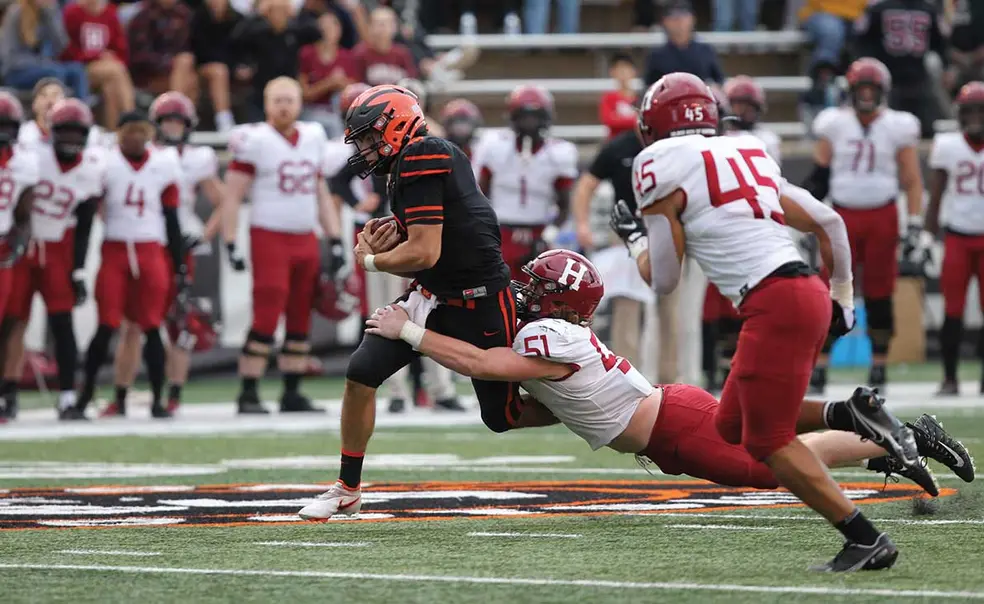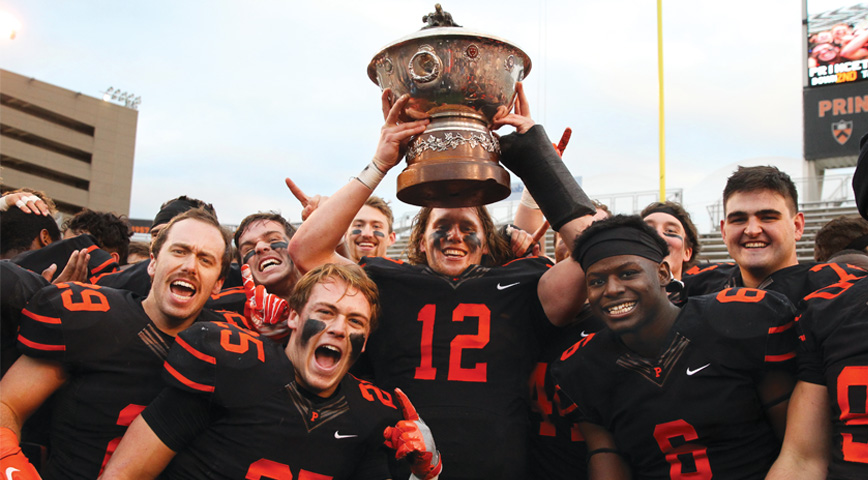Ivy League to Join FCS Playoffs in 2025
The regular season champion will advance to the postseason, which the Tigers have never participated in
The winner of the Ivy League championship will be eligible for an automatic bid in the NCAA Football Championship Subdivision (FCS) playoffs starting in 2025. The Tigers have never played in the postseason — but now they have their chance.
The proposal was brought by the Ivy League Student-Athlete Advisory Committee and received final approval from the Ivy League presidents, the league announced in December.
Head coach Bob Surace ’90 said in a statement that he was thrilled with the move. “I am most excited for the players that get the opportunity to enhance what is already an incredible experience in a historic league,” he said.
Although Princeton claims 28 national championships, those titles were decided by polls and were won from 1869 to 1950. The first “Ivy Group Agreement” was made in 1945 and applied just to football. It banned postseason play and athletic scholarships. When the Ivy League Athletic Conference was organized in February 1954, revamped conference rules prohibited postseason play for football, and the sport was still omitted from the postseason section of the 2023-24 Ivy League manual.
Nicholas Hilliard ’24, a former offensive lineman for the Tigers, served as one of Princeton’s members of the Student-Athlete Advisory Committee during this decision-making process. He told PAW that the committee focused heavily on bringing the perspectives of athletes across sports and schools to make their case.
“It was really a push for us to really make it led by the student-athlete, and I think that’s something that definitely helped in the presidents’ consideration,” said Hilliard.
The committee focused primarily on the argument that football was not given equal treatment compared to other sports, all of which allow players to participate in playoff-style competition after the regular season. The Ivy League, in addition to sending teams to the NCAA playoffs, sponsors its own postseason meets or tournaments in 19 sports.
Hilliard said the committee spoke with the Ivy League’s executive director to find out what concerns the league had (budgeting and class time, according to Hilliard) so that the student committee would be able to address them specifically.
The 2024 FCS playoffs included 24 teams, 10 of which received automatic bids as conference champions. The tournament began Nov. 30 (the weekend after Thanksgiving) and finished on Jan. 6. The four highest-ranked conference teams receive a bye and play a maximum of four games in the playoff; all other teams have the opportunity to play up to five games. In recent years, the Ivy League has played a 10-game schedule, meaning a trip to the playoffs could vastly increase playing time for athletes.
“While winning an Ivy League championship will always be the primary goal of our football program, the opportunity to compete in the FCS playoff will add an exciting new element to the experience of our football student-athletes,” athletics director John Mack ’00 said in a statement.
In 1978, the NCAA organized two different levels of Division I college football — the Football Bowl Subdivision (FBS) and the FCS, formerly I-A and I-AA. Ivy League schools joined the I-AA division in 1982.
FCS schools are allowed to offer 63 full football scholarships, though the Ivy League doesn’t offer any. FBS schools are allowed to award up to 85 scholarships to football players, and it formerly had an average home attendance requirement of 15,000, though that was phased out in 2023.
The Ivy League said in its announcement that in the coming months it will determine tiebreakers for deciding who receives the league’s automatic postseason bid in years when there are co-champions. Head-to-head results would likely be the first tiebreaker, based on the league’s practices in other sports.
If Princeton wins the Ivy League title next year, it won’t be playing against Notre Dame or Ohio State for the crown — those are FBS teams. But now the Tigers — and all the Ivy League teams — have the chance to go up against nonconference opponents for even bigger honors.













1 Response
Raphael Murillo ’12
1 Year AgoPrinceton Football’s National Champions
Curiously, football national championship claims are in fact independent of polls (and other NCAA-recognized selectors). All but one of Princeton’s claims predate the first poll in 1936. In its claimed 1950 championship, Princeton only finished 6th in the Associated Press poll but went undefeated and was recognized as the national champion by two math-based selection systems.
Editor’s note: The Princeton Athletics site lists 28 national championships, 15 of which are also on the NCAA website’s official list.